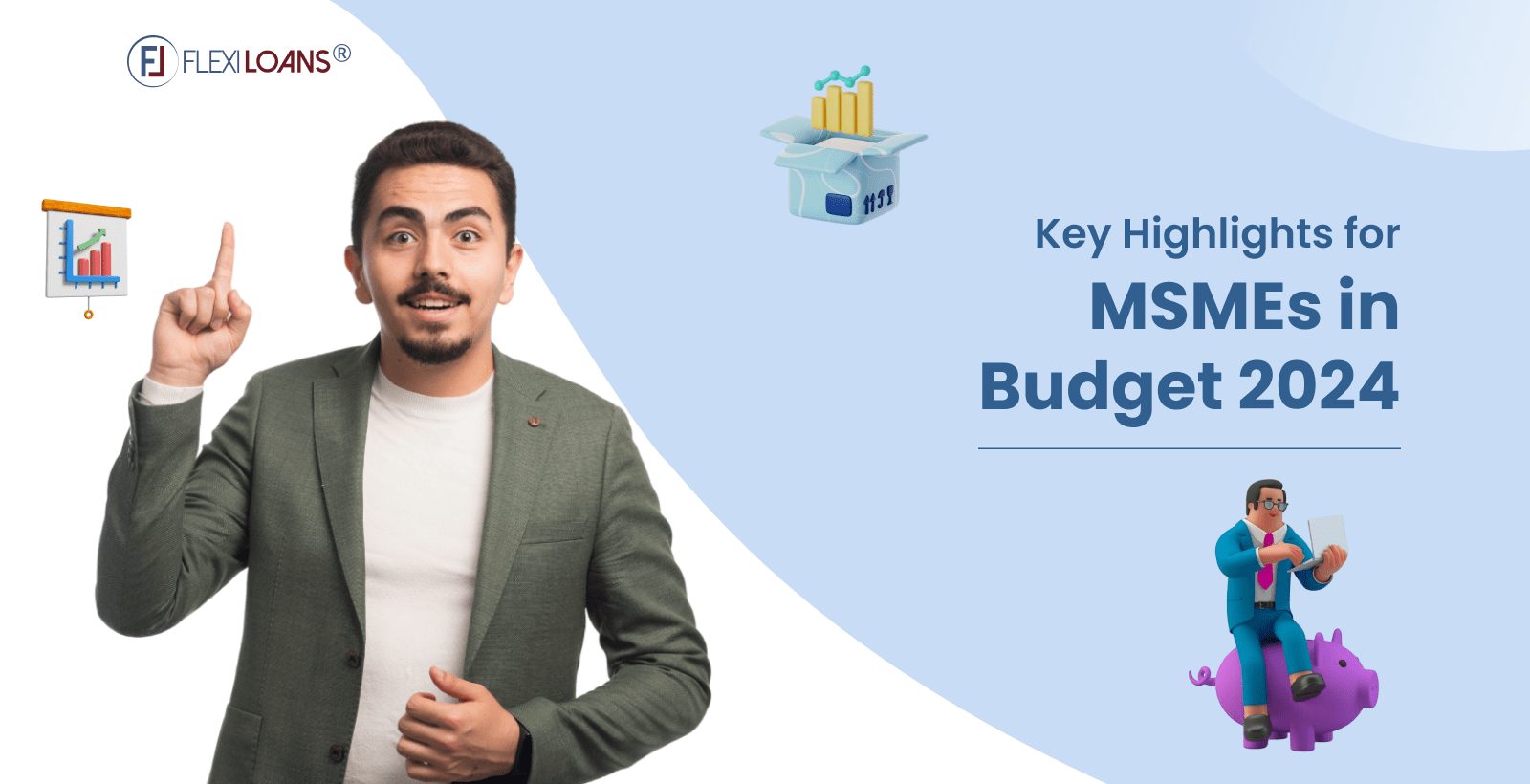Jun 06, 2024
Nov 29, 2025

The Union Budget for 2024 showcases a strong commitment towards the development of the Micro, Small, and Medium Enterprises (MSMEs) sector and provides a plethora of opportunities for their growth potential. The budget has allocated ₹22,137.95 Crores to support MSMEs’ operational requirements, growth, and innovation. Additionally, the budget prioritises technology-led solutions, allocating ₹450 crores.
The 2024 Budget for MSMEs pushes for the Pradhan Mantri Vishwakarma Scheme, a Central Sector Scheme launched by the Ministry of Micro, Small and Medium Enterprises (MSMEs) on 17th September 2023. The scheme has been specially designed to facilitate the growth and uplifting of 18 trade sectors of the nation that includes potters, blacksmiths, weavers, carpenters and others to enhance their productivity and services. The budget has also facilitated the Guarantee Emergency Credit Line (GECL) for eligible MSMEs. Let us take a look at some of the key highlights for the distribution of funds, opportunities for MSMEs loans, and its possible effects on the industry.
1. Allocation of Funding
The Budget of 2024 evidences Government of India’s (GoI) recognition of MSMEs’ role as a critical player in promoting economic growth and job creation. The significant allocation of money for its Micro and Small Cluster Development Programme at ₹400 crores, and allocation to PM Vishwakarma Scheme at ₹4,824 crores reflects government’s inclination towards this sector. Official budget records state that the overall amount allotted to MSMEs is ₹22,137.95 crores, which is a 41.6% increase from the previous fiscal year.
Funding Allocation Breakdown:
- Cash for Expansion: Through various schemes and credit lines, the sizeable amount of the funds allotted are set aside to provide accessibility of funds to MSMEs for their operations. This covers funding options including grants, loans for MSMEs, and subsidies meant to help start-ups and expand already-existing companies.
- Innovation Support: Promoting innovation in the MSME sector costs a significant amount. To encourage innovation and entrepreneurship among small enterprises, that entail funding R&D projects, adopting new technologies, and creating innovation hubs, the Atma Nirbhar scheme like GECL provides funding opportunities to such enterprises.
- Operational Needs: By providing financing for working capital, infrastructure development, and capacity building, the budget also attends to the operational needs of MSMEs. This assistance is necessary to ensure operability and survival of the small businesses.
2. Tax benefits for Micro, Small and Medium Enterprises (MSMEs)
The Budget 2024 has introduced a number of tax benefits to promote investment and growth of entrepreneurship among Micro, Small and Medium Enterprises (MSMEs). The incentive purports to lessen the tax burden on small businesses and improve the conditions that foster their expansion. Following are some of the pertinent tax relaxations in the budget:
- Lower Corporation Tax Rates: Reduced corporation tax rates are a great benefit to MSMEs. It has been lowered to 22% from 30% of the last budget for existing corporations and a substantial 15% for new enterprises. Small businesses can retain more of their income with this lowered tax rate, which they can invest for growth, innovation, and enhancing operational effectiveness.
- Exemptions for Qualifying Small Enterprises: The Budget has allocated exemption for enterprises with income of up to ₹7 Lakhs. Additionally, the MSME sector and professionals will continue to enjoy tax relaxation under the presumptive tax scheme on their revenue or profits. Startups and small businesses benefit from these exemptions, which frees up capital for business expansion and growth prospects.
- Investment Incentives: The Budget has put forth an intuitive tax-free business loan incentive for a corpus of INR one lakh crore for 50 year interest period. This tax deduction for investments made in MSMEs boosts ease of procurement of loans for business, promoting entrepreneurship while creating new job opportunities. This step encourages both domestic and foreign investors to direct capital into small firms.
3. Simplifying Compliance for MSMEs
The Budget has strategically lessened the burden of compliance for MSMEs by streamlining regulatory procedures in addition to offering tax benefits and GST relaxation. With simplified compliance methods, small enterprises can more easily handle regulatory obligations, focus on their primary business undertakings. The relaxed compliance operations fulfil the following objectives:
- Digitisation of Processes: The new Budget pushes for digitisation for small and micro enterprises. It encourages online registration, tax return filing, and compliance reporting, among other regulatory processes. Digital platforms, including online business loan procurement, facilitate MSMEs meet regulatory requirements more quickly by streamlining administrative tasks, cutting down on paperwork, and increasing accessibility while staying competitive in the cut-throat market.
- Single Window Clearance: The introduction of a single window clearance system further eases the numerous licensing necessities and permit requirements for starting and running a business. This reduces administrative delays and bureaucratic barriers, making it easier for MSMEs to comply with regulations by removing the need to communicate with multiple government entities to get clearance.
- Decreased Compliance Obligations: By getting rid of superfluous regulations, the Budget rationalises the simplified compliance obligations for MSMEs. This reduces the paperwork with less time devoted to administrative work, simultaneously accelerating the process.
- Programs for Capacity Building and Awareness: The government regularly conducts workshops and seminars informing MSMEs on best industry practices, tax regulations and requirements for regulatory compliance. The government also holds seminars for capacity building and awareness. Such interactions allow the small businesses to learn of the various benefits first hand while being informed of the breaches to avoid.
4. Skill Development for MSMEs
The Government of India (GoI) mandates skill development programs by organising workshops, seminars, talks in various regions of the country. Each Ministry has multiple flagship initiatives that interact with people at grassroot level to upskill them by introducing contemporary and advanced methods. With the Digital India Drive, it has become easier for government entities to penetrate hard to reach regions and arm the common populace with modern knowledge.
The Union Budget 2024 has prioritised Skill Developement and Educational training of Micro, Small and Medium Enterprises to assist growth and become global competitors. It includes funding for training programs, technical enhancement and projects that are specifically designed to meet the requirements of small enterprises, acknowledging the vital role that a competent workforce plays in the success of MSMEs. These apprenticeship programs and skill development initiatives seek to bridge the skill gap, increase MSMEs’ competitiveness, and boost production. The following are some essential elements of MSMEs’ skill development programs:
- Tailored Training Programs: The National Apprenticeship Training Scheme (NATS) received ₹600 crore fund allocation and the Capacity Building and Skill Development Scheme has received funding of ₹538 crore in the Budget to support the creation and execution of training initiatives designed especially to meet MSMEs’ skillset. The training program covers a range of topics, including marketing, digital literacy, company management, technical skills, and entrepreneurial development, among others. Also, under Skill India Mission, 3000 new ITIs have also been established and National Livelihood Mission-Ajeevika has attracted a budget of ₹15,000 crores.
- Workshops on Capacity Building: In order to equip MSMEs with the tools and resources they need to improve their skills and capabilities. The government has planned to host interactive sessions, seminars, and workshops on capacity building. These workshops are planned to run in conjunction with training providers, academic institutions, and industry specialists incorporating international industry standards.
5. Market Access for MSMEs
Leveraging various novel schemes and initiatives, the Budget aims to expand the market reach for MSMEs’ market reach and visibility, recognising the significance of market access for their expansion and sustainability. By making it easier for MSMEs to venture into both domestic and foreign markets, these programs hope to increase their clientele and growth prospects. Important actions to improve MSMEs’ access to markets include:
- Support for E-commerce Platforms: Harnessing the formidable network of e-commerce platforms, the MSMEs can take advantage of wide exposure for better reach for their goods and services and growing customer base. Under the Budget, the various schemes included provide easier access to business loans and other financing opportunities. This also includes access to online training, marketing practices for e-commrce, utilsing digitised solutions and skill development programs. This is also in-line with GoI’s Make in India’s initiative.
- Initiatives for Export Promotion: The Union Budget has carefully articulated fund allocation to facilitate smooth export promotion initiatives for eligible MSMEs. Through these programs the MSMEs can secure online loan for business, support for market research and services for export facilitation. The purpose of these programs is to motivate MSMEs to penetrate international markets by adopting the ITC tool in their production operation and take advantage of export prospects. This also incentivises free import of raw material, good and other essential inputs.
- Participation in Trade Fairs and Exhibitions: Funds allotted in the Budget to MSMEs so they can take part in both domestic and foreign trade affairs, exhibitions, and business networking gatherings. The multitude of initiatives like the Market Development Assistance Scheme, Procurement and Marketing Support Scheme and others give MSMEs a chance to exhibit their goods, connect with possible clientele, and research new market niches.
- Programs for Market Linkage: The government assist in establishing connections between MSMEs and major enterprises, government organisations, and retail chains. This could entail setting up marketplaces where buyers and sellers can connect, supporting initiatives to diversify suppliers, and encouraging cooperation among MSMEs and anchor companies.
6. Digitisation and Technology Adoption for MSMEs
The Budget acknowledges the innovative and competitive potential of MSMEs with adoption of advanced technologies. The Budget includes subsidies or incentives targeted at easing MSMEs’ adoption of digital tools, automation, and Industry 4.0 practices in order to motivate them to adopt technology solutions.
One of the key focuses of adoption of technology is to expedite swift MSME loan procurement. MSMEs eligible to apply for business loan can secure the desired amount in a complete paperless process. In addition to this, the loans for business, specially for small enterprises comes in subsidised amount.
7. Subsidies for Technology Investments for Micro, Small, and Medium Enterprises (MSMEs)
MSMEs may be eligible for financial incentives or subsidies from the budget if they choose to invest in technology solutions including automation equipment, software, and digital tools. The purpose of these subsidies is to reduce the upfront expenses of adopting new technology and increase the affordability of infrastructure upgrades for small firms.
Micro and Small Enterprises (MSEs) can receive a 15% subsidy for technological upgrades through the Credit Linked Capital Subsidy Scheme (CLCSS) in 2024. It is based on the purchase price of plant and machinery and is capped at ₹15 lakh. The highest MSME loan amount eligible for this subsidised computation is ₹100 lakh. The CLCSS program is now paperless and available online. The MUDRA Yojana and Stand Up India initiative aims to aid further in the smooth acquisition of credit facilities.
- Encouragement of Industry 4.0 Methods: The term ‘Industry 4.0’ describes how digital technologies like cloud computing, big data analytics, artificial intelligence (AI), and the Internet of Things (IoT) is incorporated into production operations. Through information-sharing programs, partnerships with technology companies, and awareness campaigns, the Budget is pushing MSMEs to embrace Industry 4.0 methods.
- Support for Digital Transformation: The Union Budget has allocated funding for MSMEs undergoing digital transformation aimed at fostering technology adoption-related training and capacity building in addition to financial incentives. These initiatives give MSMEs the information, abilities, and tools they need to successfully integrate and apply technological solutions into their daily operations.
8. Budgetary Support for Women and Minority-Owned Businesses
The Government of India’s every mandate resonates inclusivity and equality. The Union Budget 2024 allocating special provisions for women and minority-owned businesses showcase GoI’s value in fostering inclusivity and diversity in the business sector. There are special programs targeted at assisting women and minority-owned Micro, Small, and Medium-Sized Enterprises (MSMEs) providing them the required boost. These programs aim to arm women and minority business owners access to capital, training, small business loan, MSME loans, business loan for women and market possibilities while addressing and resolving the issues faced by them.
The Minister of Finance Smt. Nirmala Sitaraman announced ‘Lakhpati Didi’ scheme which will target 3 crore women enhancing reach from the previously 2 Crores. It is for women Self Help Groups(SHGs) that earn atleast ₹1 lakh per annum. This program involves business loan for women, venture capital funds, or special lending plans designed to meet the needs of small business owners.
Futher extending it to Anganwadi and Accredited Social Health Activist (ASHA) workers, the Budget has announced allocation of health cover of up to ₹5 lakh under Ayushman Bharat scheme to ensure financial security. Women’s financial independence and economic empowerment are further strengthened by the Mahila Samman Savings Certificate, that stimulates savings practices and offers a secure investment option.With Mahila Samman Savings certificate, women can save up to ₹2 lakh at a 7.5% interest rate for a period of two years. The programme is a safe investment choice for women and provides appealing rewards on savings.
Conclusion
The Union Budget 2024 seems to be quite a beneficial opportunity for Micro, Small, and Medium Enterprises (MSMEs). With multitude of novel schemes and meticulous budget allocation, the Budget promises a prosperous outlook for MSMEs this year and also provides special provision for women and minority-led organisations. FlexiLoan is another such business loan provider that facilitates smooth disbursal of funds for MSMEs, small enterprises and start-ups in a complete digital manner with minimal documentation. This fin-tech initiative is truly helpful for the organisation with limited credit history and collateral.
Frequently Asked Questions
Increased funding, tax breaks, streamlined regulations, market access, and incentives for adopting new technologies are a few of the policies included in Budget 2024 that are intended to assist MSMEs. These policies intend to foster an atmosphere where MSMEs can prosper and support economic expansion.
There has been special funding allocation in Budget 2024 with the express purpose of assisting Micro, Small, and Medium Enterprises (MSMEs) by giving them access to finance for needs related to operations, innovation, and expansion. The goal of this enhanced investment is to encourage the MSME sector’s sustainability and expansion.
The Budget 2024 includes investments in industrial parks, logistics, and transportation infrastructure development to fuel connectivity and support the expansion of MSMEs. To boost productivity and lower operating expenses, the government has allocated 3.3% of GDP with focus on logistics and transportation for Micro, Small, and Medium Enterprises (MSMEs) to prosper.
Yes, specific measures to help women and minority-owned MSME, including market exposure, training, and financial access-business loan for women, are included in Budget 2024. By encouraging inclusivity and diversity in the industry, these programmes enable minority and women entrepreneurs to achieve success in their ventures through multitude of schemes and initiatives.







